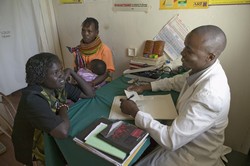Universal healthcare gets support in Africa
In South Africa, the National Health Insurance plan will promote strategic purchasing of health services from an integrated pool of tax revenues. Further north, Tanzania sought to bring health insurance schemes (for both formal and informal sector workers) under the administration of just one insurer. The project UNITAS(opens in new window) (Universal coverage in Tanzania and South Africa: Monitoring and evaluating progress) reviewed policies related to revenue generation, fund pooling, purchasing, service delivery and management, and governance. The goal was to provide a kind of early warning system by highlighting problems in policy formation, planning and implementation. This overview of policy processes rendered data and allowed for improvements over time, thus strengthening their potential to move towards a universal health coverage system. Both countries focused on improving delivery and management of public health sector services rather than introducing major financing reforms. Efforts aimed at universal healthcare mean reduced health system inequalities and improved coverage for all populations, health services and costs. For South Africa, project work centred on innovations targeting improved district-level service delivery and management. In Tanzania, the focus was on core innovations aimed at strengthening primary healthcare and the removal of financial barriers to its access. UNITAS tracked the evolution of policy design and preparations for implementation. It initiated specific policy analyses, including the role of external influences and the process of policy transfer. Partners monitored the implementation of each innovation to track policy reforms. Other work involved advancing tools for district-level evaluation of reform implementation, and critical evaluations of the current status of both countries' health systems vis-à-vis universal coverage goals. Partners also provided feedback based on research findings to policymakers and health managers. By providing important insights into reform implementation processes, UNITAS outcomes will help South Africa and Tanzania reduce inequalities in financial protection and access to healthcare for all groups. The work promises to have a major societal impact, and can be extended to other low- and middle-income countries seeking improved healthcare and universal health coverage.







